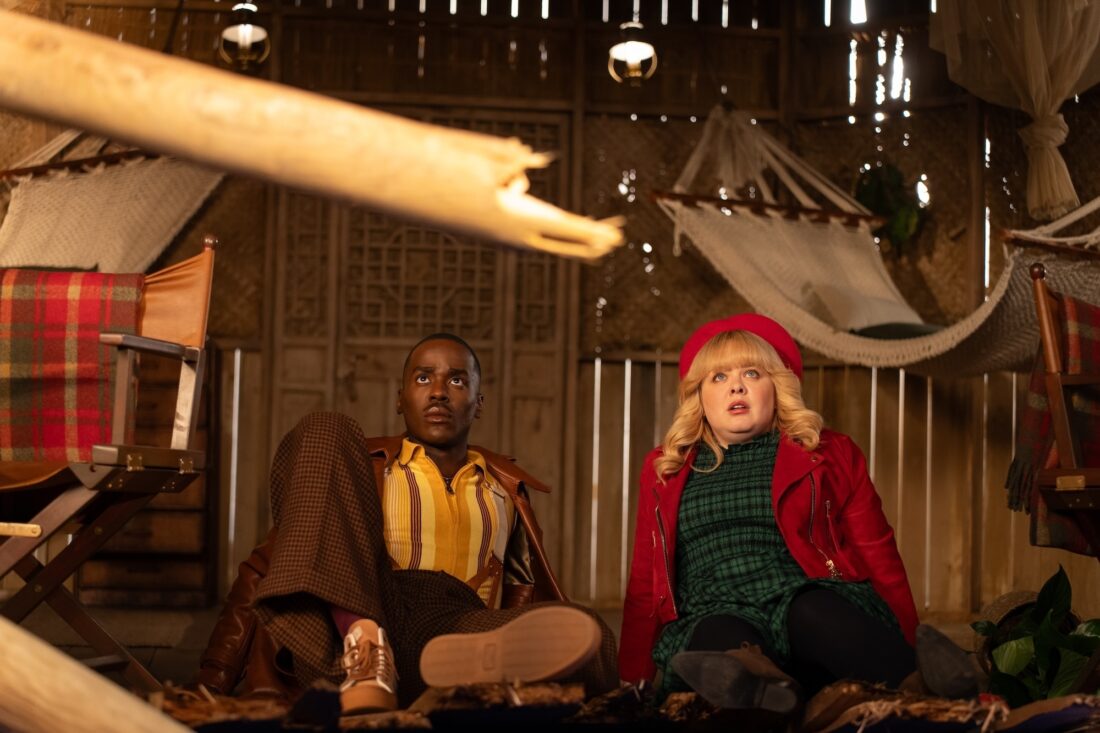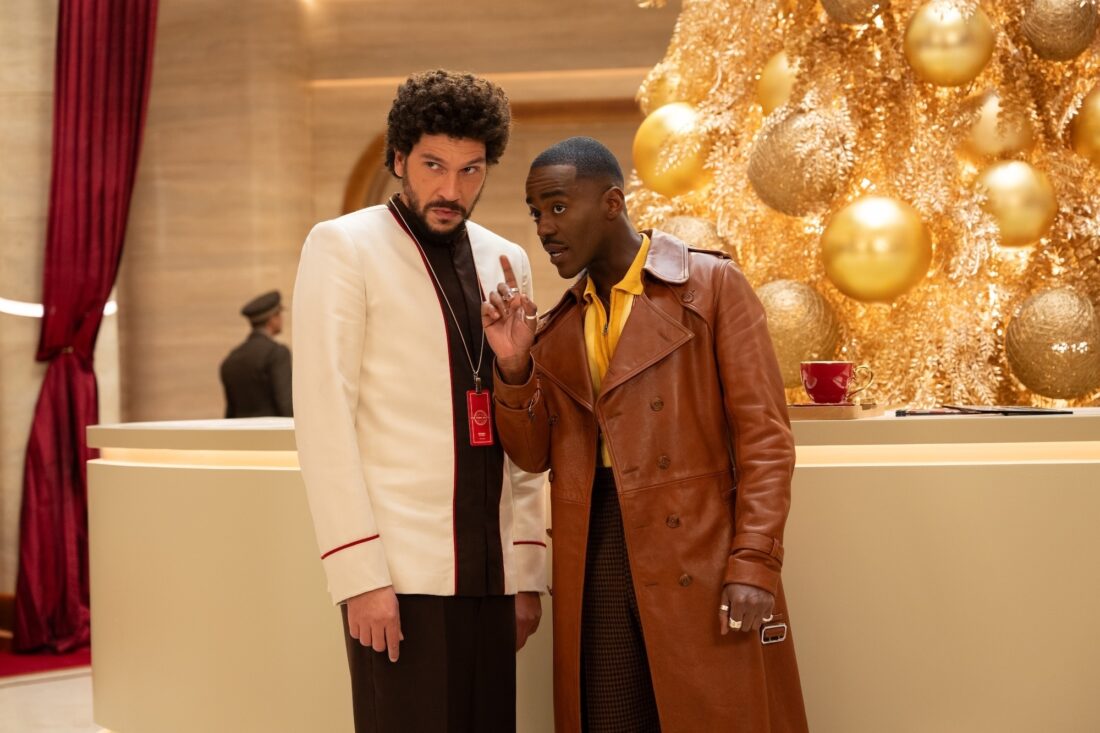We open on the London Blitz, and like Dr. Sam Beckett at the start of every Quantum Leap episode, I mutter “Oh boy…”
Recap
It’s the London Blitz and the Doctor enters in on a couple, asking if they need a ham and cheese toastie and a pumpkin latte. They don’t appear to, so he moves on, arriving on the Orient Express in 1962, a Mount Everest basecamp in 1953, and the Sandringham Hotel on Christmas 2024. Before he arrives there, though, a woman named Joy (Nicola Coughlan) gets a room from the proprietor, Anita (Steph de Whalley). Right after she checks in, a Silurian (Jonathan Aris) holding a briefcase appears. He tells her “The star seed will bloom and the flesh will rise.” The Doctor enters and quickly knows he’s found the right spot. It turns out that the Doctor is at the Time Hotel in London on Christmas, year 4202. He arrives to get some milk for his coffee and is spotted by Trev (Joel Fry), who works at the hotel. The Doctor heads back into the TARDIS, but notes that he’s put on his coat and grabbed the sonic—he noticed something.
He emerges into the hotel lobby and sees a man with a briefcase (Joshua Reese) chained to his wrist—and Trev wants to know what he’s doing here. The Doctor claims that he’s a special investigator and that Trev works for him now. He figures out the conceit of the Time Hotel, orders his toastie and pumpkin latte, and lets that fellow with the briefcase head off to the bar. Mr. Briefcase hands the case off to the barman (Liam Prince-Donnelly), who is now chained to the case and possessed. He tells the man that he’ll be dead shortly. The barman calls Trev into the bar and hands off the briefcase to him as the first man disintegrates. As the Doctor heads into different rooms and offers his snack tray, Trev heads to reception and hands the briefcase to the Silurian hotel manager—the case is trying to upgrade its access. Trev dies, disappointed that he’s let the Doctor down. The Doctor meets Joy and hotel manager, and he wants to know what the briefcase is, but he also knows that the manager is far too keen for him to take it. Joy gets irritated that everyone is ignoring her and grabs the briefcase instead.
Joy is now possessed and tells the manager that he’s dying. The Doctor talks the manager through his death, then opens the briefcase to find a star seed inside. The briefcase says that the wearer will be disintegrated if it’s not closed, but then demands a security code that they don’t have. The Doctor from the future bursts in to give them the code—he takes Joy and tells himself that he needs to go the long way around to get the code. The current Doctor starts yelling at himself that this is the reason why everyone leaves him, and that he lives in a spaceship with chairs and doesn’t even notice because no one comes around. The future Doctor locks him into the hotel room and breaks the connection. The Doctor goes downstairs and asks Anita if she needs any help around the place. He works at the hotel for a whole year, becoming close friends with Anita and upgrading everything with Time Lord tech. He eventually asks her about the door in his room that’s always locked; she says that most of those doors lead to cupboards, but the one in the honeymoon suite isn’t.
At the end of a year, the Doctor has to leave, but he tells Anita that he enjoyed this sample of the slow path in life because he got one whole year of her. They share a tearful farewell and the Doctor finds another door to the Time Hotel in New York City. He breaks in on himself to give the code and breaks the connection so previous him has to take his year-long break. The Doctor learns that the thing possessing Joy is looking for the right time zone to leave the star seed in; the Doctor realizes that a corporation is using the Time Hotel to get their own custom-made star for a energy source in no time at all. The Doctor starts tweaking at Joy about what kind of person would choose the hotel room he found her staying in, insisting the hotels are mirrors that show how people truly think of themselves. He starts to tease her for her name, saying that it doesn’t suit her at all, and wondering why her mother named her that. Joy begins to get angry and tells him that she couldn’t see her mother when she died because of the “rules” in the hospital during the covid pandemic. She said goodbye to her mother on an iPad on Christmas.
Joy breaks down, not realizing that the Doctor was trying to get her roused because her emotions broke the connection, and the suitcase is no longer attached to her. He figures out that the people behind using the star seed is Villengard (the same arms manufacturer from “Boom.”) all over again, completely fine with destroying the Earth to get their star. He also didn’t notice that they walked into a room linked to the late Cretaceous Period: a T-rex eats the briefcase, giving the star seed time to mature. Back in the hotel halls, the Doctor panicking, but the sonic starts buzzing—Trev and all the victims of the briefcase have been uploaded into the Villengard systems, and Trev has been working from the inside to help the Doctor locate the star seed. He leads them to the next time period, and the briefcase has been buried in a temple millions of years later. The Doctor drags rope from the Everest crew through several time periods within the hotel and attaches it to the temple wall to free the briefcase.
The Doctor gets back to the temple, but he can’t find Joy or the briefcase. Ascending a staircase, he finds Joy outside glowing. She’s absorbed the star seed (along with the fellow occupants who held the briefcase), and plans to take it away far enough that it won’t hurt anyone. Joy is happy to be saving the world, and doesn’t mind becoming a star. She ascends into the heavens and is reborn. Everyone across the timelines sees her shining, including Ruby, at home, who calls her mom. A representative (Fiona Marr) from the Time Hotel comes to see Anita and offer her a job, with a card from the Doctor. During the pandemic in 2020, we see Joy saying goodbye to her mother, but after they get off the phone, the star shines on her mother and the two join together. The Doctor sees the star and realizes the importance of it: She is the star shining over Bethlehem on the day that Christ is born.
Commentary

When “Bethlehem: 0001” flashed on the screen, I shrieked “noooooo” at my television like Darth Vader learning that Padmé died.
Wow, I hate it so much? And that’s without getting into niggling pedantic things like—the hotel is supposed to be Christmas everywhere you go, but if you do believe that Jesus was one real-life person who was born on planet Earth, it was absolutely not on December 25th. Or other pedantic things like—Joy absorbs the star seed (somehow) and once she does that gives her the ability to fly into space, billions of lightyears away in an instant and also for the star’s light to reach Earth IMMEDIATELY.
Oh fine, it’s Christmas magic? Yeah, let’s go with that because it’s super meaningful that this woman, whose only characteristics are “plucky” and “lost her mom during the pandemic in an extremely traumatic way” is now a shining star that makes people feel things. Anita actually gets more character build-up than their major guest star (Nichola Coughlan deserved so much better than this), and it turns out that wasn’t part of the original plan either: Anita’s character originally had far fewer lines, but the production team liked her so much that the part was expanded.
As a result, we have an incredibly unbalanced episode where the Doctor forms this sweet bond with a woman he gets to take the slow path with for a year. We don’t know enough about her either, but we know more enough that it feels as though she should be the co-star of this tale. Her story is this lovely little microcosm of the bonds the Doctor sometimes forms with people, and how that bond can be both painful and uplifting at once. But again, we have no idea why anything in Anita’s life is this way, and why she’s so alone with only this hotel to look after. If her character and Joy’s had combined, we’d have had one solid piece of plot and a whole character to enjoy.
Look, I was ready to get swept away. When we started on the London Blitz, I assumed Moffat was having a dig at himself, and I appreciated the impulse. But then we immediately get into the bit about how one hotel door is always locked and no one ever asking why or where it goes. Which is Moffat 101 for creating horror: name a normal thing that people don’t realize is extremely creepy, then give it a reason for existing.
The problem is, people do usually ask what that locked door in a hotel room is about. I always asked. I’ve never known a person to not ask on entering a room. And the two primary answers are boring and pretty obvious—they’re either cupboards full of cleaning supplies, or they’re doors that connect private rooms, so that large parties can bug each other without having to head out into the hallway. This is not much of a mystery or an effective way to build tension.
Then there’s the whole speech from the Doctor about Joy’s room, and how a hotel room is actually “you without makeup.” Which, yes, he’s trying to upset her, but he should be doing that by saying something true? Hotel rooms don’t indicate anything about a person aside from economic status—if you’re in a crappy room, it’s what you can afford, and maybe you were also really bad at researching to boot. Turning it into a chance to psychologically evaluate someone into losing their temper doesn’t come off clever here. It feels like a sloppy deduction from the BBC Sherlock days, but at least Sherlock was frequently told he had it wrong.
But moreover, this episode manages to be neither comforting, nor sad enough to be a moving experience. If the episode had been more silly or more serious, we might’ve had something to enjoy. As is, this felt like a sizable train wreck of cringe after cringe after cringe. The first ten minutes were far more enjoyable than the rest of the episode. Give me a new version that’s just the Doctor and Trev bumbling about the place, and we’ll have something to work with next time.
Time and Space and Sundry

- Special Agent Clint Rock? Really, sweetie?
- The never-ending mansplain joke is at least a decade too late, and not well executed in the slightest. Sigh.
- Jonathan Aris made a great Silurian, and it was sad that he and Frenchie from Our Flag Means Death both died so soon. RIP, Trev, you were a real one.
- I do love the idea that there are little TARDIS sculptures all over the world that people make because they see it all the time without entirely knowing it. And that does play into the religious aspect of the episode in a way that doesn’t feel forced and gross—the TARDIS as this emblem of faith that people don’t even realize they’re perpetuating.
- It’s been a while since we’ve had a full romp with dinosaurs on Who (“Dinosaurs on a Spaceship” is a dozen years old, if you can believe that), but I’m a little disappointed that they’re still going for the old standbys when they could be the folks who tried to conceptualize dinosaurs with feathers? Doctor Who is a perfect place to try that out, and it would’ve made for great paleontology jokes.
Comments will be closed for the holidays. See you in the new year!
Here’s hoping that next year’s holiday special will do anything else…

